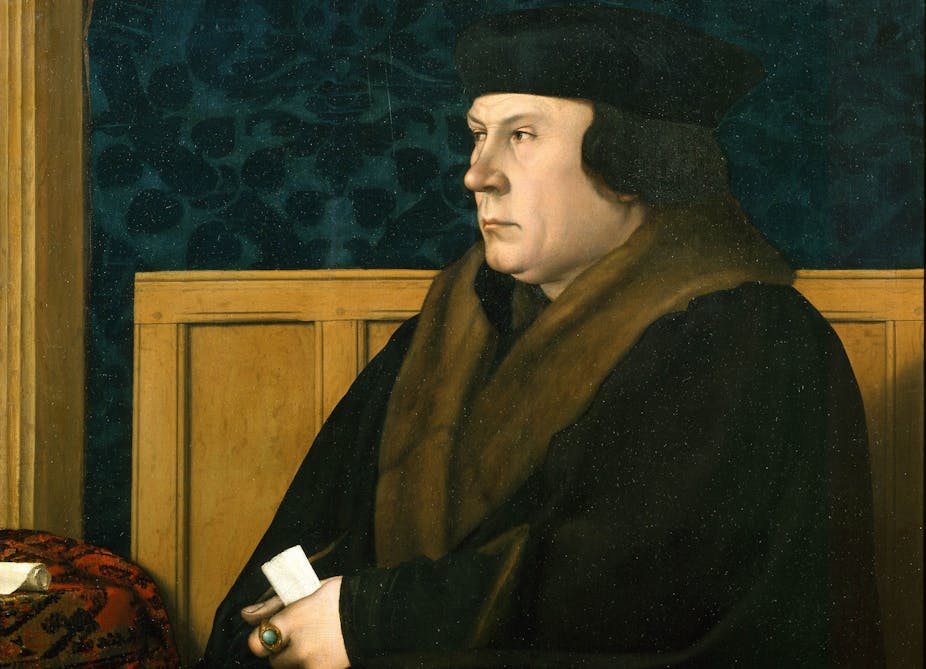The secret services are recruiting – you may have seen advertisements seeking linguists or computer specialists placed by MI5 and MI6 in respectable publications. This is quite a change from the official position that they didn’t exist maintained as recently as 20 years ago.
While these organisations’ origins lie in the world wars of the 20th century, we can trace their signature features back to the 16th and 17th centuries. And in doing so we find that many of the problems they face today – plots, terrorism, political unrest and foreign interference – would be very familiar to the spies and spymasters of the earlier era – such as Thomas Cromwell, for example, Henry VIII’s spymaster whose life forms the story of Wolf Hall.
Living as we do in the age of Edward Snowden and Julian Assange, we also find at that time similar tensions between the needs of the “secret state” and the demands of the growing public sphere.
An early modern interest in secrecy
Unquestionably, governments in the early modern era were always keen to cultivate an air of mystery. The arcane nature of ruling was seen as a natural part of an elite skill set – this suggestion of innate superiority obviously appealed to those in power.
Government secret actions, as journalist and pamphlateer Marchamont Nedham argued in his 1656 work The Excellencie of a Free State, was made up of “things … of a nature remote from ordinary apprehensions”. This way of framing the debate allowed governing to appear both mysterious and a skillful art outside the norms of life. These were, James Stuart himself noted, “no themes or subjects fit for vulgar persons or common meetings”. As “subjects” the role of the people in the early modern state was to “contain themselves within that modest and reverent regard of matters above their calling”. They might not have had an actual Official Secrets Act hanging over their head, but the people were certainly meant to know their place.

And therein lay the tension which we can perhaps sympathise with today. Because just as governments developed their arcana imperii, or secrets of state, outside in the world a new landscape of media thronged with reams of printed newspapers, pamphlets and books, while in coffee houses political gossip and whispered knowledge flourished – of politicians, but also of the state’s secret affairs.
It was feared that were state matters discussed widely this would weaken the doctrine of secrecy, perhaps even dispelling the “magic” of government and dissolving the boundaries between rulers and ruled. Given our world of endless speculation on social media, and the British government’s resistance to revealing anything at all about the workings of government throughout much of the 20th century, this should sound very familiar.
Dark arts
Unsurprisingly, the secret-state approach also provided a natural base from which to operate clandestine activities. Here we find many of the same activities used today. Spies and informers, and infiltration by foreign agents – such as William Gregg, who sold secrets to France before he was caught, tried and hanged in 1708. Political kidnapping was known on occasion, and political assassination, while rare, included serious attempts on Elizabeth I, the Stuart kings and Oliver Cromwell – the Gunpowder Plot of 1605 against James I is the most notable example.
The interception of post was common. As with the myth in modern times of the UK’s GCHQ, it was alleged that hardly any letter was safe. In 1649, for example, Cromwell’s regime:
Authorised [its officers] to open and view all such letters or pacquets as you or they shall conceave may conteyne in them any matter or thing prejudicial to the Commonwealth.
The uncovering of plots and conspiracies were regularly publicised (some of them were even true). Like the blossoming conspiracy theories of today, at that time even the Great Fire of London was blamed on a Franco-Popish Plot. Writer and poet John Dryden later noted: “Plots, true or false, are necessary things, To raise up commonwealths, and ruin kings”. It is a sentiment that is still true today.
Modern electronics aside, the covert practices of today had their parallels in the early modern state. Governments would cheerfully justify their use, while an increasingly open and demanding public would respond with moral outrage if their use was discovered. Even in the 16th and 17th centuries the government’s philosophical justifications were emerging: the practicalities of politics and foreign affairs were more than enough justification to cast spying and subterfuge as statecraft’s necessary evil, and even to proclaim its virtues in respect of the need to protect the then newly formed British nation. Again, it is a justification still familiar today.
A tension developed between state – which suspected and feared the very idea of the public and its opinions, and which considered espionage, suppression and censorship as vital – and the press and public sphere, which sought to know not only how but also why decisions were made on their behalf, and who stood to gain from them. Commentators of the time fondly imagined that knowing this would illuminate how things were done, and “the Great Ministers of State … [would be] … presented naked, their consultations, designs, policies, the things done by them … exposed to every man’s eye”. Having laid the foundations for 400 years of state secrecy, it is a wish that is as true today as it was then – and one that is as unlikely to be fulfilled.

